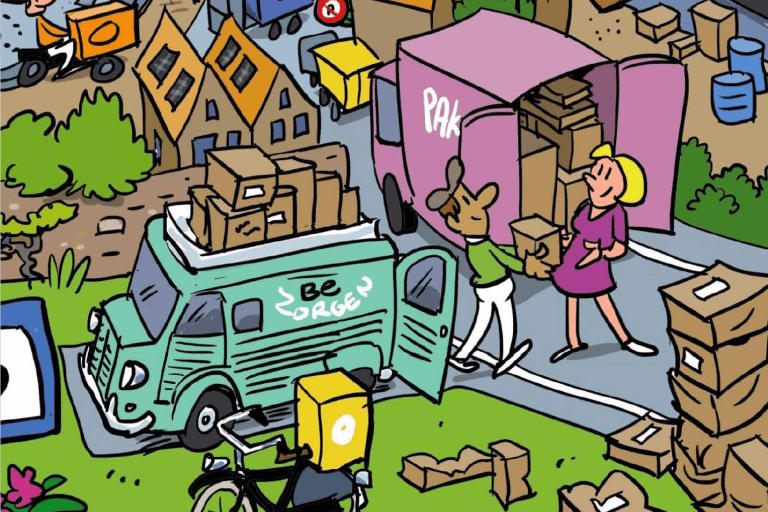- Home
- Research
- Professorships
- smart cities and logistics
- low impact last mile logistics

Low-Impact Last-Mile Logistics
The LILS – Low Impact in Last-Mile Logistics – SPRONG group is developing sustainable solutions for urban logistics. Through collaboration across four universities of applied sciences, LILS aims to minimise the impact of deliveries in the final kilometres, particularly in busy urban areas. By integrating logistics with spatial planning, mobility, and digitalisation, the project supports broader societal transitions whilst making cities more liveable.
What was the goal?
LILS aims to advance good practice-based research that mitigates the negative consequences of urban logistics, including emissions, traffic congestion, and safety hazards. LILS focuses specifically on making the last mile, the final stage of urban delivery, more efficient, cost-effective, and sustainable. The project seeks to develop solutions that contribute to societal transitions and improve collaboration between governments and logistics parties, which currently remains insufficient. With last-mile activities predicted to grow by 20% in the next decade, finding sustainable solutions is increasingly urgent.
What method was employed?
LILS conducts practical research through local living labs and learning communities, enabling innovations to be tested and implemented in real-world settings. The research is organised around three central themes: 1. Smart utilisation of scarce urban space, aiming for zero impact 2. Encouraging behavioural change amongst purchasers and consumers 3. Leveraging digitalisation to create opportunities, including digital twins and Physical Internet concepts The project is structured around four pillars: developing a joint research and innovation roadmap; integrating knowledge from various domains; establishing a knowledge hub for collaboration in projects and education; and implementing an organisational excellence programme to enhance research professionalism and quality.
What findings did we uncover?
As this is an active research project that commenced in January 2025, specific findings have not yet been documented. The project is currently in its execution phase, working towards developing and implementing solutions across the three research themes. Results and innovations are expected to emerge throughout the project duration as living labs and collaborative research activities progress.
What is the timeline of this project?
1 January 2025 – 31 December 2028
Who are our main collaborating partners?
The project brings together four universities of applied sciences as key partners: Breda University of Applied Sciences (BUas) (lead institution), HAN University of Applied Sciences, Rotterdam University of Applied Sciences and Amsterdam University of Applied Sciences. Additional collaborating partners include: TNO (Netherlands Organisation for Applied Scientific Research), Delft University of Technology, Municipality of Rotterdam, Radboud University, DHL, TLN, VUB, RUG, Province of Gelderland, Municipality of Alphen aan den Rijn, and various other public and private sector organisations working in logistics, spatial planning, and urban development.
Who is our funding partner?
The project is part of the SIA SPRONG programme. SIA SPRONG aims to further position and raise the profile of universities of applied sciences in the regional, national (and international) knowledge ecosystem and help with their further development as knowledge institutions. The SPRONG funding is intended to further develop the research infrastructure of the applied research of universities of applied sciences.

Want to read more?
Website Low-Impact Last-Mile Logistics
Interested in other publications?
BUas uses Pure for all research publications; the up-to-date overview of all BUas knowledge output.